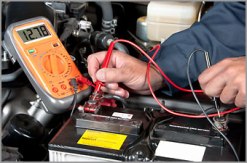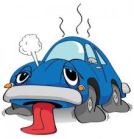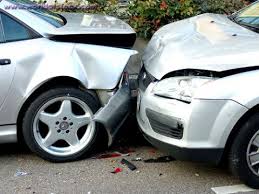With only a few days left until Xmas and then the new year, many will be hitting the roads heading back to villages to home towns on Nigeria’s expressways out of the cities.
Like every year, the roads will be choc a bloc Christmas Eve from around noon so make sure you leave early to avoid the traffic jams of people trying to escape the city.
It also means that desperation will prevail so roads will be that much more dangerous as people will take serious risks to get in front and get to their destination. The number of accidents during the holiday season is known to increase dramatically so please do take care.
So, what’s the best way to ensure the safety of you, your loved ones and other drivers on the road?
First, if you’re planning in advance and even if you got your car serviced recently, it’s a good idea to have it checked anyway so that any small fault can be made right instead of you finding yourself stranded miles away from anywhere.
Before you travel, make sure you do the following checks:
1. Check your lights:
You’ll need to trafficate, brake, drive through foggy conditions, perhaps even drive in the early hours- all of these requir e working head lights. Replace any bulbs that have burnt out and have some spares just in case.
e working head lights. Replace any bulbs that have burnt out and have some spares just in case.
Make sure that your headlights are adjusted correctly – ensuring that light beams offer adequate viewing distance, without being adjusted too far upwards, causing visibility problems for oncoming motorists.
2. Check your windows & wipers:
Don’t rely on air conditioning, you’re definitely going to need a back up. So if your windows are automatic, check to make sure that all windows go up and down, are in good condition and that any cracks or chips are repaired. A damaged windscreen not only reduces visibility, but also limits the windscreen’s ability to protect you if it rains or if there’s an accident.
Nigerian rain is no joke so don’t play around with your wiper blades. Check to make sure all the mechanisms are performing well and that it makes a clean sweep every time.
3. Check your wheels and tyres:
An obvious one is to make sure that each of your tires has adequate tread. The legal limit is 1mm of tread, but anything below 3mm limits the tire’s ability to function effectively.
Check to see if your vehicle’s tires are wearing evenly. Uneven wear can indicate a worn steering or suspension component, an over or under inflated tire or bad wheel alignment and/or balancing.
Make sure that you carry a spare wheel that is in good condition and that you have the correct jack and other tools to remove a damaged wheel and tire. A vulcaniser may not be available on every corner like you’re used to.
that you carry a spare wheel that is in good condition and that you have the correct jack and other tools to remove a damaged wheel and tire. A vulcaniser may not be available on every corner like you’re used to.
4. Check your brakes:
Check your vehicle’s brake fluid level and top it up if necessary. Then, ensure that all brake discs, drums and pads are in good condition, performing well and that they are wearing evenly. Do an emergency stop test to make sure. Any uneven wear, strange noises or vibrations from the braking system should be reported to your mechanic and fixed.
5. Check your suspension:
We don’t need to tell you about the state of Nigeria’s roads. You’re bound to hit a pothole or two. So make sure that your vehicle’s shock absorbers and other suspension systems are keeping the tires firmly on the ground.
If your vehicle’s ride quality is harder than it normally is, it rolls a lot when turning into corners or needs a longer distance to stop. Worn or damaged suspension parts like shocks or struts may need to be replaced.
6. Check your battery:
Test you r vehicle’s battery to make sure that it’s delivering the correct charge and, in the case of serviceable batteries, that the battery water is topped up.
r vehicle’s battery to make sure that it’s delivering the correct charge and, in the case of serviceable batteries, that the battery water is topped up.
7. Check your belts and chains:
Check to make sure that all belts and chains connected to the cam, alternator, fan and other components are in good condition. Broken belts and chains can cause major engine damage, and inconvenience.
8. Check your Cooling system:
You do not, I repeat, you do not want to drive any sort of long distance  without a functioning air conditioning system. Check that the radiator and water pump are functioning correctly. Also make sure that the radiator cap seals properly and that the coolant fluid is clean and top
without a functioning air conditioning system. Check that the radiator and water pump are functioning correctly. Also make sure that the radiator cap seals properly and that the coolant fluid is clean and top
ped up to the correct level.
9. Check your filters and fluids:
Another obvious one. Make sure that all major filters – oil, air and fuel filters – are clean and functioning well. When you change the oil filter, make sure that you drain all old oil from your vehicle and replace it with new oil that matches the vehicle manufacturer’s specifications. Make sure that all fluids are at their recommended levels. Fix any leaks.
10. Check your exhaust system:
Give the exhaust system a good once over to check for any leaks. A damaged exhaust system will not only cause vehicle performance- and fuel consumption issues, but also poses a serious health risk.
11. Check body panels, mountings and accessories:
We have to say it because to most Nigerians, vehicles are there to carry double their load. If you are carrying a load and I’m almost certain you’ll be br inging all sorts of gifts back to your friends and family, make sure that all body panels, mountings and accessories – including tow bars and the trailers etc. attached to them, are properly fastened and secured. The same applies to any load your vehicle may be carrying.
inging all sorts of gifts back to your friends and family, make sure that all body panels, mountings and accessories – including tow bars and the trailers etc. attached to them, are properly fastened and secured. The same applies to any load your vehicle may be carrying.
Just make sure that your vehicle isn’t overloaded.
12. Safety / warning equipment:
God willing, nothing will happen to you but if it does, you need to be prepared. Be sure to have at least a reflective triangle or flashlight handy to warn oncoming motorists when your car has broken down. The palm branches can always be added later. Many drivers rely on their vehicles’ emergency indicators only, not bearing in mind that these may not be visible in foggy, rainy or dark conditions. And in the case of an electrical fault / battery trouble, these may not be available.
13. Check your insurance:
Finally, make sure that you have adequate car insurance in place, and all support/emergency numbers at hand, in case something does happen.
If you need any advice on insurance, call CHD and we can advise.




